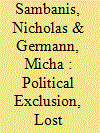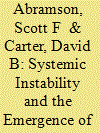|
|
|
Sort Order |
|
|
|
Items / Page
|
|
|
|
|
|
|
| Srl | Item |
| 1 |
ID:
177787


|
|
|
|
|
| Summary/Abstract |
Several generations of scholarship have identified the medieval development of urban self-government as crucial for European patterns of state formation. However, extant theories, emphasizing structural factors such as initial endowments and warfare, do little to explain the initial emergence of institutions of urban self-government before CE 1200 or why similar institutions did not emerge outside of Europe. We argue that a large-scale collapse of public authority in the ninth and tenth centuries allowed a bottom-up reform movement in West Francia (the Cluniac movement), directed by clergy but with popular backing, to push for ecclesiastical autonomy and asceticism in the eleventh and twelfth centuries. These social realignments, facilitated by new norms about ecclesiastical office holding, stimulated the urban associationalism that led to the initial emergence of autonomous town councils. Using a panel data set of 643 towns in the period between 800 and 1800, we show that medieval towns were substantially more likely to establish autonomous town councils in the period between 1000 and 1200 if they were situated in the vicinity of Cluniac monasteries. These findings are corroborated by regressions that use distance from Cluny—the movement's place of origin—to instrument for proximity to Cluniac monasteries.
|
|
|
|
|
|
|
|
|
|
|
|
|
|
|
|
| 2 |
ID:
177785


|
|
|
|
|
| Summary/Abstract |
Originally developed by applying models from cognitive psychology to the study of foreign policy decision making, the field of behavioral IR is undergoing important transformations. Building on a broader range of models, methods, and data from the fields of neuroscience, biology, and genetics, behavioral IR has moved beyond the staid debate between rational choice and psychology and instead investigates the plethora of mechanisms selected by evolution for solving adaptive problems. This opens new opportunities for collaboration between scholars informed by rational choice and behavioral insights. Examining the interactions between the individual's genetic inheritance, social environment, and downstream behavior of individuals and groups, the emerging field of behavioral epigenetics offers novel insights into the methodological problem of aggregation that has confounded efforts to apply behavioral findings to IR. In the first instance empirical, behavioral IR raises numerous normative and philosophical questions best answered in dialogue with political and legal theorists.
|
|
|
|
|
|
|
|
|
|
|
|
|
|
|
|
| 3 |
ID:
177786


|
|
|
|
|
| Summary/Abstract |
Most civil wars are preceded by nonviolent forms of conflict. While it is often assumed that violent and nonviolent conflicts are qualitatively different and have different causes, that assumption is rarely tested empirically. We use a two-step approach to explore whether political exclusion and lost autonomy—two common causes of civil war according to extant literature—are associated with the emergence of nonviolent separatist claims, with the escalation of nonviolent separatist claims to war, or both. Our analysis suggests that different types of grievances matter more at different stages of conflict escalation. We find that political exclusion is a significant correlate of the escalation of nonviolent claims for self-determination to violence, while its association with the emergence of nonviolent separatist claims is weaker. By contrast, lost autonomy is correlated with both the emergence of nonviolent separatist claims and, if autonomy revocations are recent, their escalation to violence. We argue that these results are consistent with both grievance- and opportunity-based theories of conflict.
|
|
|
|
|
|
|
|
|
|
|
|
|
|
|
|
| 4 |
ID:
177784


|
|
|
|
|
| Summary/Abstract |
Although evidence shows that territorial disputes fundamentally shape relations among states, we know surprisingly little about when territorial claims are made. We argue that revisionist states have incentives to make territorial claims when the great powers that manage the system are in crisis. We identify five main sources of systemic instability and develop measures of each of them, demonstrating that the majority of territorial claims in Europe are drawn at times when regional great powers are embroiled in crisis, for example, 1848 or 1870 during the nineteenth century. The claims that emerge at these times are not necessarily among states involved in the crises that generated turmoil (e.g., Prussia and France in 1870). We use a newly developed spatial measure of historical boundary precedents in Europe from 1650 to 1790 to demonstrate that the effect of this known spatial correlate of where claims are drawn matters only when the European system is in crisis. We further demonstrate that this claim-timing pattern is general to the global system of states. In the appendix we corroborate our explanation of our findings with a detailed case study of the territorial claims that led to the contemporary Italian state's formation.
|
|
|
|
|
|
|
|
|
|
|
|
|
|
|
|
| 5 |
ID:
177781


|
|
|
|
|
| Summary/Abstract |
In response to President Trump instigating conflict over trade with China, the Chinese government countered by issuing tariffs on thousands of products worth over USD 110 billion in US exports. We explore whether China's tariffs reflected a strategy to apply counterpressure by hurting political support for the president's party. We also assess the strategy's impact on the 2018 midterm elections and examine the mechanism underlying the resulting electoral shift. We find strong evidence that Chinese tariffs systematically targeted US goods that had production concentrated in Republican-supporting counties, particularly when located in closely contested Congressional districts. This apparent strategy was successful: targeted areas were more likely to turn against Republican candidates. Using data on campaign communications, local search patterns online, and an original national survey, we find evidence that voters residing in areas affected by the tariffs were more likely to learn about the trade war, recognize its adverse impact, and assign the Republicans responsibility for the escalating dispute. These findings demonstrate how domestic political institutions can be a source of vulnerability in interstate disputes.
|
|
|
|
|
|
|
|
|
|
|
|
|
|
|
|
| 6 |
ID:
177783


|
|
|
|
|
| Summary/Abstract |
The international community often seeks to promote political reforms in recalcitrant states. Recently, some scholars have argued that, rather than helping, international law and advocacy create new problems because they have negative spillovers that increase rights violations. We review three mechanisms for such spillovers: backlash, trade-offs, and counteraction and concentrate on the last of these. Some researchers assert that governments sometimes “counteract” international human rights pressures by strategically substituting violations in adjacent areas that are either not targeted or are harder to monitor. However, most such research shows only that both outcomes correlate with an intervention—the targeted positively and the spillover negatively. The burden of proof, however, should be as rigorous as those for studies of first-order policy consequences. We show that these correlations by themselves are insufficient to demonstrate counteraction outside of the narrow case where the intervention is assumed to have no direct effect on the spillover, a situation akin to having a valid instrumental variable design. We revisit two prominent findings and show that the evidence for the counteraction claim is weak in both cases. The article contributes methodologically to the study of negative spillovers in general by proposing mediation and sensitivity analysis within an instrumental variables framework for assessing such arguments. It revisits important prior findings that claim negative consequences to human rights law and/or advocacy, and raises critical normative questions regarding how we empirically evaluate hypotheses about causal mechanisms.
|
|
|
|
|
|
|
|
|
|
|
|
|
|
|
|
| 7 |
ID:
177782


|
|
|
|
|
| Summary/Abstract |
For more than a decade, the United States military has conceptualized and discussed the Internet and related systems as “cyberspace,” understood as a “domain” of conflict like land, sea, air, and outer space. How and why did this concept become entrenched in US doctrine? What are its effects? Focusing on the emergence and consolidation of this terminology, I make three arguments about the role of language in cybersecurity policy. First, I propose a new, politically consequential category of metaphor: foundational metaphors, implied by using particular labels rather than stated outright. These metaphors support specific ways to understand complex issues, provide discursive resources to some arguments over others, and shape policy contestation and outcomes. Second, I present a detailed empirical study of US military strategy and doctrine that traces the emergence and consolidation of terminology built on the “cyberspace domain.” This concept supported implicit metaphorical correspondences between the Internet and physical space, yielding specific analogies and arguments for understanding the Internet and its effects. Third, I focus on the rhetorical effects of this terminology to reveal two important institutional consequences: this language has been essential to expanding the military's role in cybersecurity, and specific interests within the Department of Defense have used this framework to support the creation of US Cyber Command. These linguistic effects in the United States also have implications for how other states approach cybersecurity, for how international law is applied to cyber operations, and for how International Relations understands language and technological change.
|
|
|
|
|
|
|
|
|
|
|
|
|
|
|
|
|
|
|
|
|